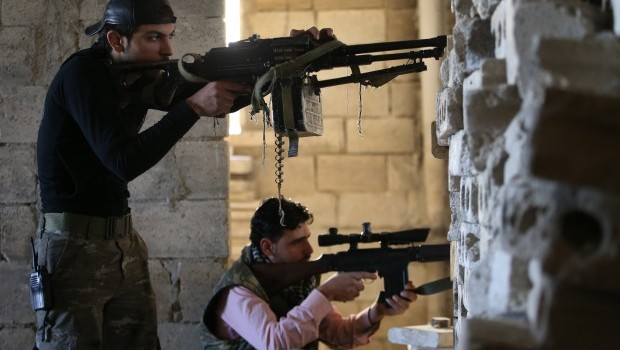
Free Syrian Army fighters observe the Syrian army base of Wadi al-Deif in Idlib province, Syria, Tuesday Feb. 26, 2013. Source: AP Photo/Hussein Malla
Speaking to London’s The Guardian newspaper, the Syrian National Coalition representative in London, Walid Suffour, said that the group expected a “breakthrough that will end the restrictions of the European countries” before the next ‘Friends of Syria’ meeting, due to take place sometime in the next few months.
Currently, the member-states of the European Union have an arms embargo in place on exports to Syria, but modified it on Thursday to permit the supply of ‘non-lethal’ equipment, like body armor and night-vision gear.
The newspaper also quoted an anonymous source involved in supplying the Syrian rebels, who said that the movement of weapons to rebel fighters in Syria from across the Turkish border had increased in recent days.
“These were not weapons that had been captured from Syrian army bases as before. These were released from the Turkish warehouses. These are weapons the opposition had purchased previously but had not been allowed to take across the border,” the source told The Guardian.
This may be a reference to the appearance of Chinese-made surface-to-air missiles in the hands of Syrian rebels, according to Eliot Higgins, a British blogger who tracks the spread of different weapons across Syria. His ‘Brown Moses’ blog has become a valuable source of information to journalists covering the Syrian conflict, and has been used by media outlets like the New York Times, among others.
He told Asharq Al-Awsat: “What’s interesting about that is in the last week there’s been footage of the Chinese FN-6 [missiles] being used to shoot down a helicopter near Mengis airbase in Aleppo, so if that quote is accurate than it makes me wonder if it’s a reference to that.”
One of the consistent demands of the rebel groups battling to overthrow the government of Bashar Al-Assad in Syria has been for anti-aircraft rockets to counter the government’s use of helicopters and attack jets on the battlefield. However, the US has expressed serious concerns about the spread of such weapons, fearing that they may fall into the hands of terrorists linked to Al-Qaeda.
It is unknown if the US was aware of the transfer of the missiles before it took place, which would suggest a change in American policy.
This also follows the rebels’ acquisition of anti-tank weapons of Croatian manufacture, which were allegedly paid for by Saudi Arabia, according to the New York Times.
The British government has reportedly been one of the loudest voices in pushing for changes in the EU arms embargo, and has succeeded in persuading the rest of the EU to reconsider the policy in June.
A statement from a Foreign Office spokesman said: “we have negotiated a shortened renewal of the Syrian sanctions regime. By limiting the sanctions renewal to three months, the EU has the flexibility to adjust its policy sooner in response to further changes in Syria . . . we have not ruled out any option to end the violence and resolve the crisis.”
This echoes statements made by British Foreign Secretary William Hague, who told reporters on Thursday that military aid carries “its own risks, and that is why we haven’t done that so far. But I don’t rule that out.”
It is currently unclear if this represents a willingness to supply military aid, or is designed to put more pressure on the government of Bashar Al-Assad to come to the negotiating table.
